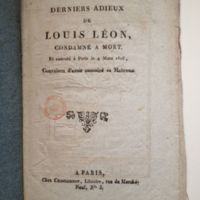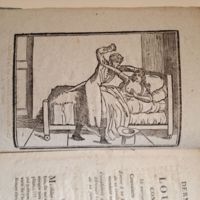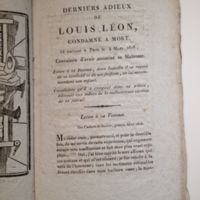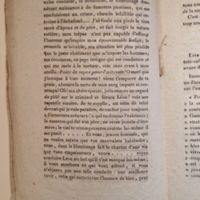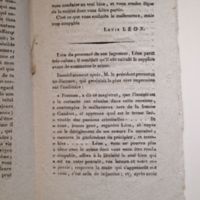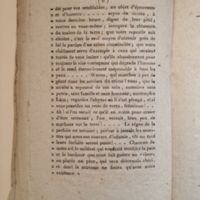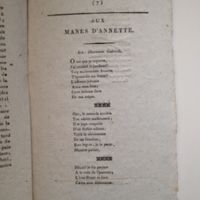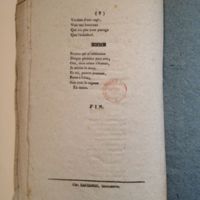Derniers adieux de Louis Léon, condamné a mort,
Title
Subtitle
Set to tune of...
no. 95 in Cle du Caveau
http://www.peter-sheppard-skaerved.com/wp-content/uploads/2012/01/page584-600px-AéDictionaryéoféMusicéandéMusiciansévolé1.djvué.jpg
GABRIELLE, CHARMANTE, that is, Gabrielle d'Estrées, mistress of Henri IV. The reign of Louis XVIII. revived an artless little romance, which, like the song äóÖVive Henri IV.' äóÖCharmante Gabrielle' was not only sung far and wide at that loyal epoch, but the authorship of both words and music was attributed to the gallant king, and the mistake is still often repeated. True Henri suggested the song to one of the poets of his court, but we have his own authority for the fact that he did not himself write the stanzas. The letter in which the king sent the song to Gabrielle is in the äóÖRecueil des Lettres missives' of Berger de Xivrey (iv. 998, 9), and contains these words:äóî äóÖCes vers vous représenteront mieulx ma condition et plus agréablement que ne feroit la prose. Je les ay dictez, non arrangez.' The only date on the letter is May 21, but it was written in 1597 from Paris, where Henri was collecting money for his expedition to Amiens, and making preparations to leave Gabrielle for the campaign against the Spaniards. It was probably Bertaut, Bishop of Séez, who, at the king's äóÖdictation,' composed the four couplets of the romance, of which we give the first, with the music in its revived form:
Charmante Gabrielle,
Percé de mille dards,
Quand la gloire m'appelle
Dans les sentiers de mars.
Cruelle départie!
Malheureux jour!
Que ne suis-je sans vie,
Ou sans amour!
The refrain is not original; it is to be found word for word in the äóÖThesaurus harmonicus' of Besard (1603), and in the äóÖCabinet ou Trésor des nouvelles chansons' (1602); and as at that time it took more than five or six years for an air to travel from the court to the people, we may safely conclude that it was no novelty. (A.D. 1450-1889), George Grove 1900.
http://books.google.com.au/books?id=OCPfcrZoH3kC&pg=PA109&lpg=PA109&dq=charmante+gabrielle&source=bl&ots=9QDékKJYA8&sig=cHrQoZX2r6R9d3rpiLjkMwG9ijE&hl=en&sa=X&ei=nBKGUOOANqijiAfR7YDIDA&ved=0CDMQ6AEwAQ#v=onepage&q=charmante%20gabrielle&f=false
Transcription
J'ai troublé le bonheur!
Trop malheureuse Annette
T'éprouvais ma fureur!
L'affreuse jalousie
Arma mon bras;
Cette hideuse furie
Fit ton trépas.
Oui, le remords accable
Ton amant malheureux;
Il se juge coupable
D'un forfait odieux:
Voilà la récompense
De tes bienfaits;
Bien ingrat, je le pense,
Monstre parfait.
Hélas! je fus parjure
A la voix de l'honneur,
L'âme féroce et dure
Causa mon déshonneur.
Victime d'une rage,
Vois ton bourreau
Qui n'a plus pour partage
Que l'échafaud.
Peuple qui m'environne
Daigne pleindre mon sort;
Oui, mon crime t'étonne,
Je mérite la mort.
Et toi, pauvre jeunesse,
Pense à Léon;
Sois avec la sagesse
En union.
FIN.
Method of Punishment
Crime(s)
Gender
Date
Printing Location
[sold at?] Paris, Chez Chassaignon, Libraire, rue du Marché Neuf, no. 3
Tune Data
Charmante Gabrielle.
no. 95 in Cle du Caveau
GABRIELLE, CHARMANTE, that is, Gabrielle d'Estrées, mistress of Henri IV. The reign of Louis XVIII. revived an artless little romance, which, like the song äóÖVive Henri IV.' äóÖCharmante Gabrielle' was not only sung far and wide at that loyal epoch, but the authorship of both words and music was attributed to the gallant king, and the mistake is still often repeated. True Henri suggested the song to one of the poets of his court, but we have his own authority for the fact that he did not himself write the stanzas. The letter in which the king sent the song to Gabrielle is in the äóÖRecueil des Lettres missives' of Berger de Xivrey (iv. 998, 9), and contains these words:äóî äóÖCes vers vous représenteront mieulx ma condition et plus agréablement que ne feroit la prose. Je les ay dictez, non arrangez.' The only date on the letter is May 21, but it was written in 1597 from Paris, where Henri was collecting money for his expedition to Amiens, and making preparations to leave Gabrielle for the campaign against the Spaniards. It was probably Bertaut, Bishop of Séez, who, at the king's äóÖdictation,' composed the four couplets of the romance, of which we give the first, with the music in its revived form:
Charmante Gabrielle,
Percé de mille dards,
Quand la gloire m'appelle
Dans les sentiers de mars.
Cruelle départie!
Malheureux jour!
Que ne suis-je sans vie,
Ou sans amour!
The refrain is not original; it is to be found word for word in the äóÖThesaurus harmonicus' of Besard (1603), and in the äóÖCabinet ou Trésor des nouvelles chansons' (1602); and as at that time it took more than five or six years for an air to travel from the court to the people, we may safely conclude that it was no novelty. (A.D. 1450-1889), George Grove 1900.

